Sep 16, 2025. Myanmar Field Visit Day 1, Visiting Nunnery Schools
Hello. Starting today, Sunim will be conducting a two-day field visit to earthquake-affected areas in Myanmar. Today, he visited two schools for female monastics.
Sunim departed from Istanbul Airport at 4:30 PM yesterday and after a 9-hour flight, arrived at Bangkok’s Suvarnabhumi Airport at 5:30 AM local time.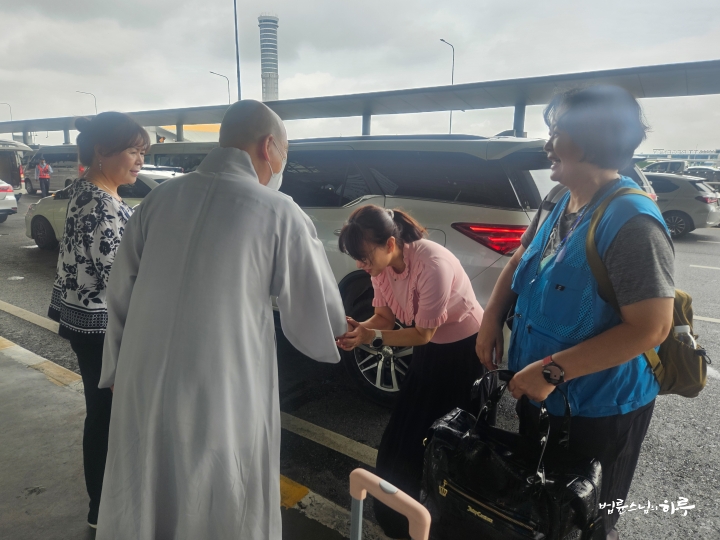
At Bangkok Airport, Jungto Society member Hwang So-yeon came to greet him. JTS representative Park Gina and Yeo Ji-won, who had departed from Korea, also arrived. They reviewed the Southeast Asia field visit itinerary and briefly organized their luggage. When moving between terminals to head to Myanmar, Kim Seon-young drove them, and Sunim presented her with a copy of his book “Buddha the Revolutionary” as a token of gratitude.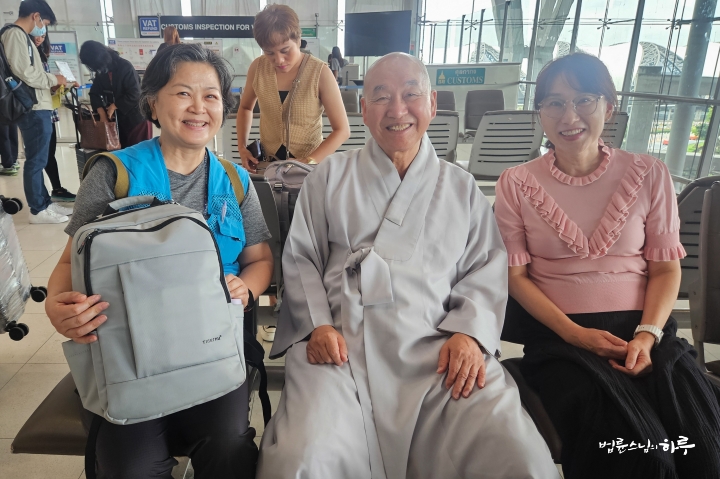
At Bangkok Airport, they met INEB (International Network of Engaged Buddhists) activist Anchali, and at 11:30 AM, they boarded a flight together to Mandalay, Myanmar. They had lunch on the plane with a packed meal that Anchali had prepared.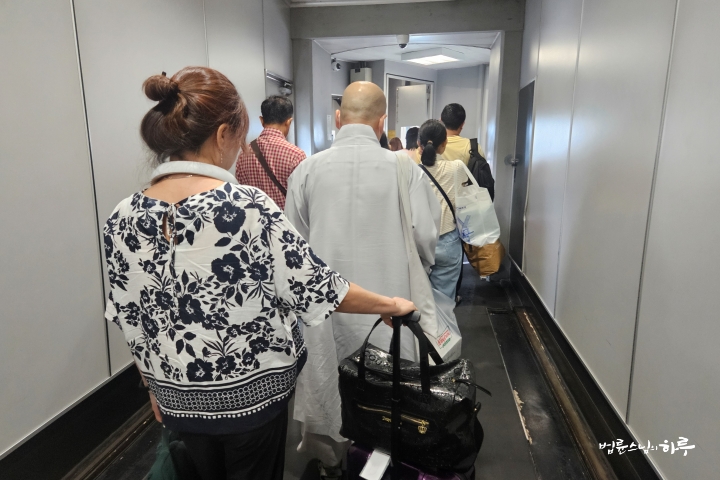
They arrived at Mandalay Airport at 12:50 PM. Upon exiting the airport, Venerable Kittisara warmly welcomed them. Venerable Kittisara had visited Jungto Society through INEB last June.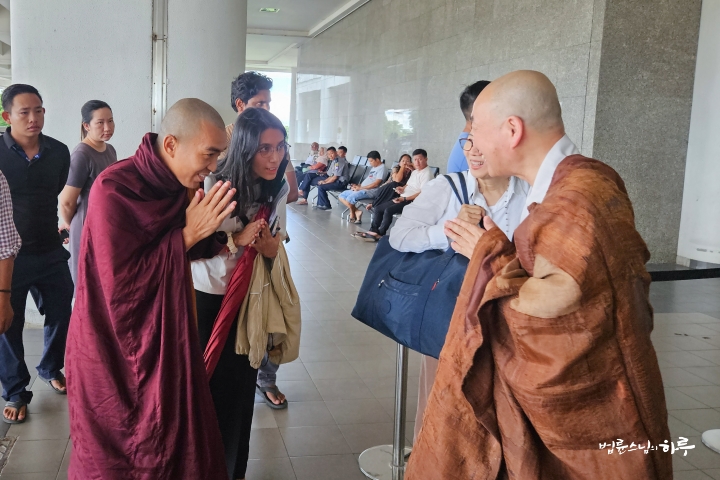
They immediately departed by car for Shwe Sat Kyar Nunnery. A nunnery is a place where female monastics (nuns) live and practice together.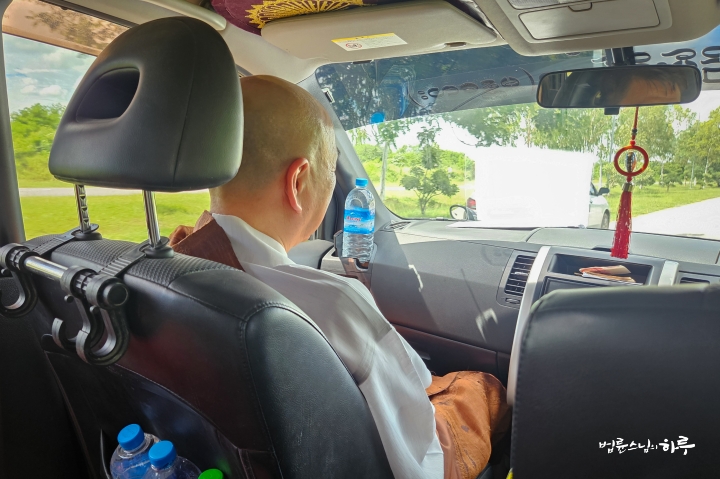
After a 40-minute drive, they arrived at Shwe Sat Kyar Nunnery at 2 PM and had tea with the abbess.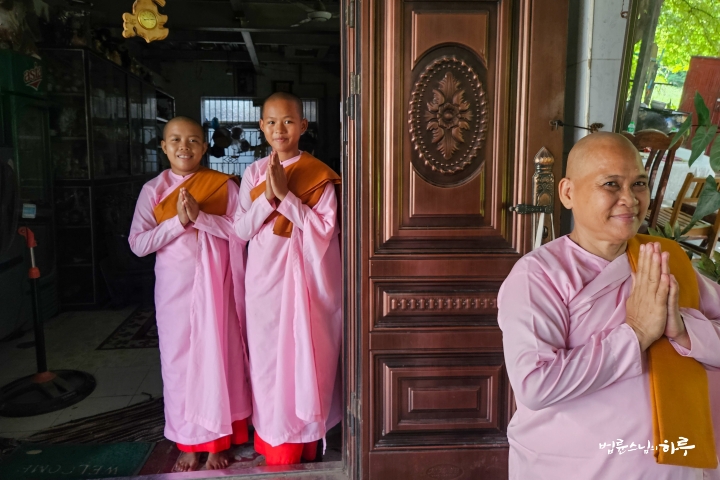
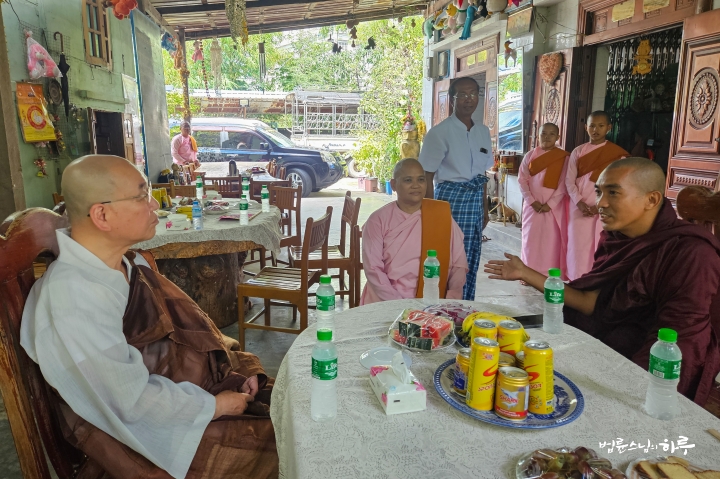
Twenty-six nuns live here, and about a hundred student nuns who reside at other nunneries attend school here. The school operates classes from grades 1 through 5, after which students are sent to other secondary schools. The abbess expressed her desire to rebuild the old school building. After the conversation, they toured the school together. When Sunim visited the classrooms, the students greeted him with joined palms.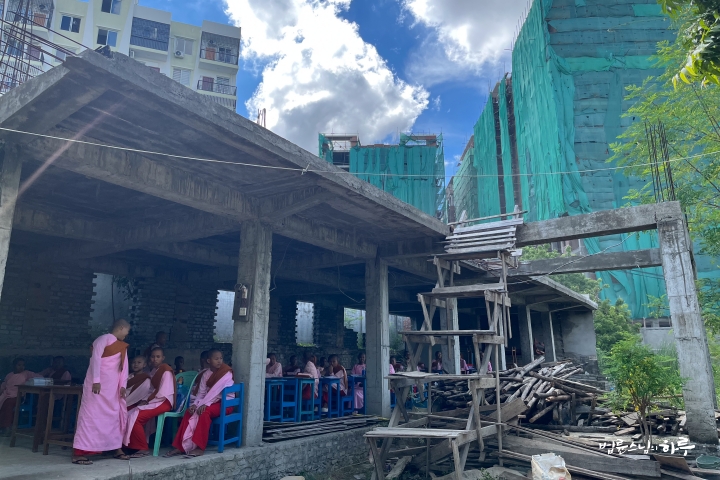
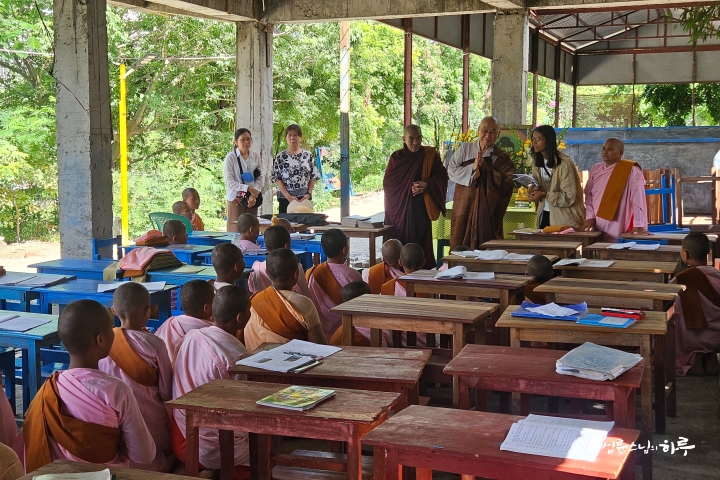
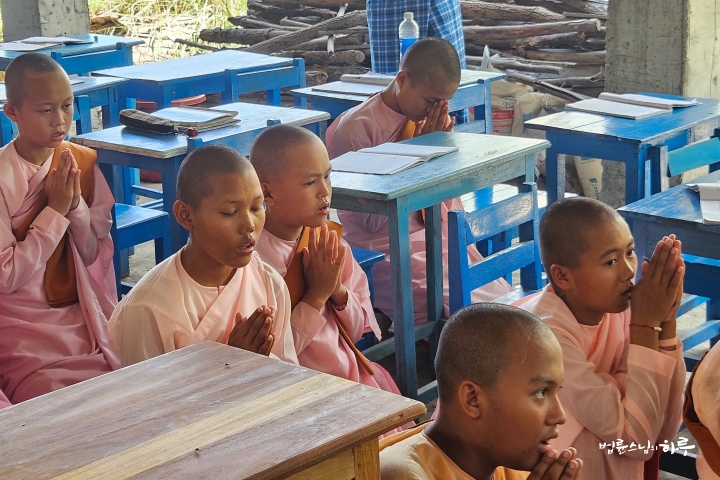
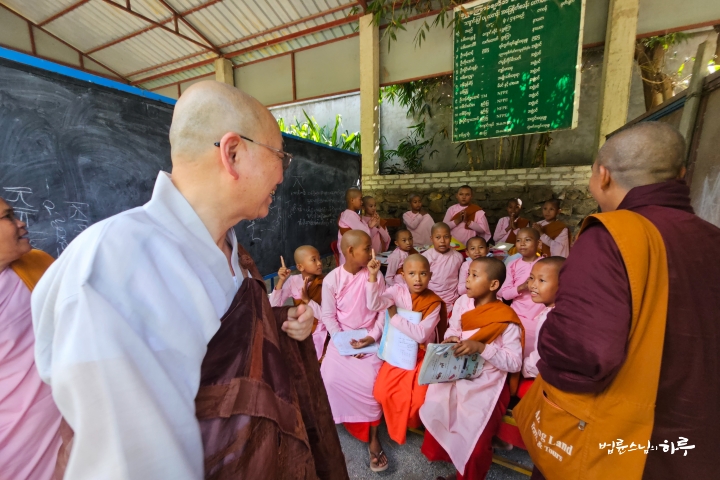
They carefully inspected the classrooms, rooftop, dormitories, and dining hall.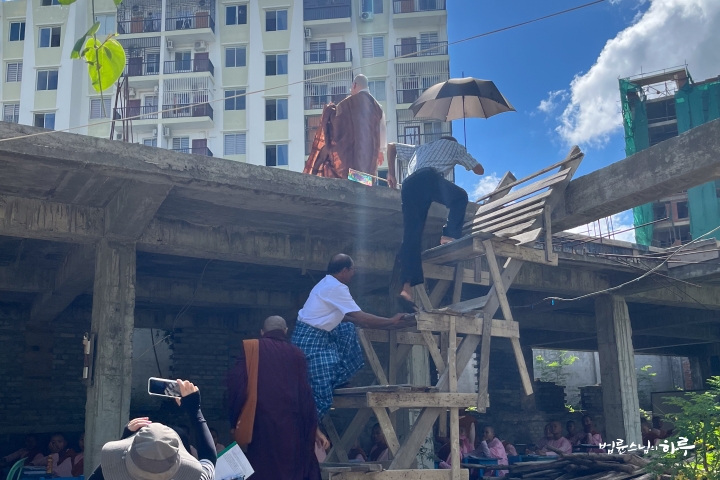
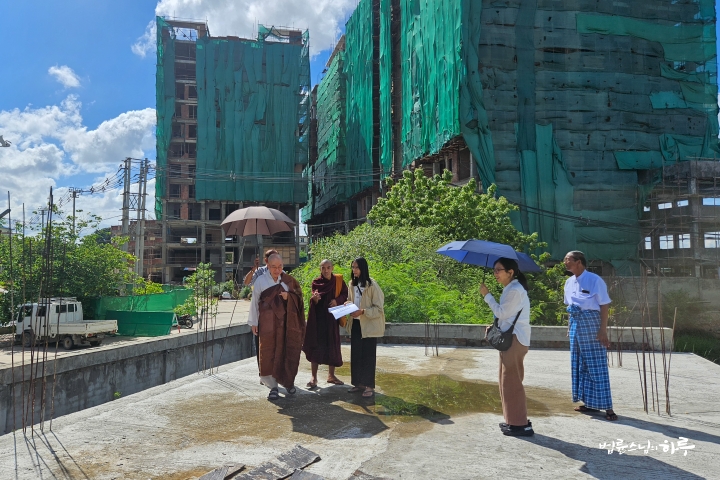
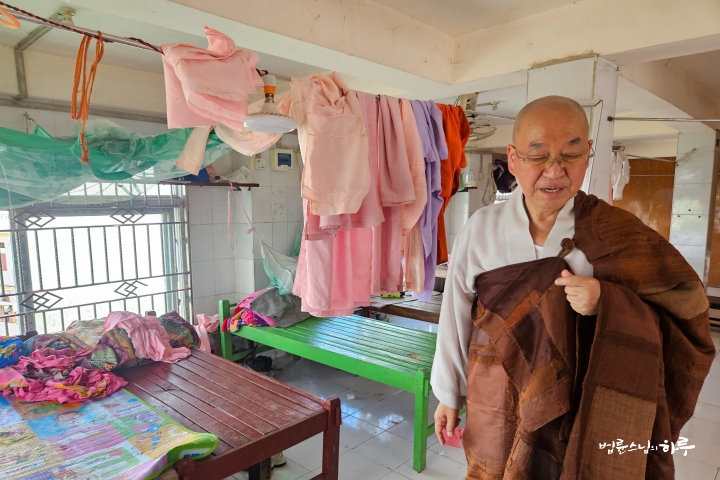
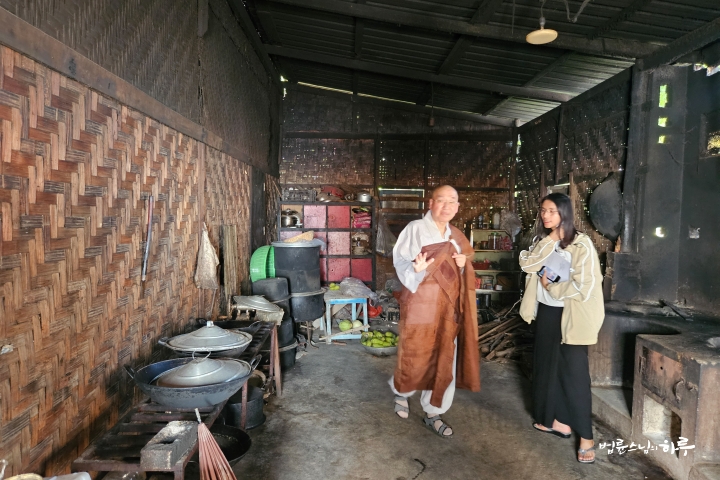
As the abbess had mentioned, the buildings were deteriorating in many places and needed repairs.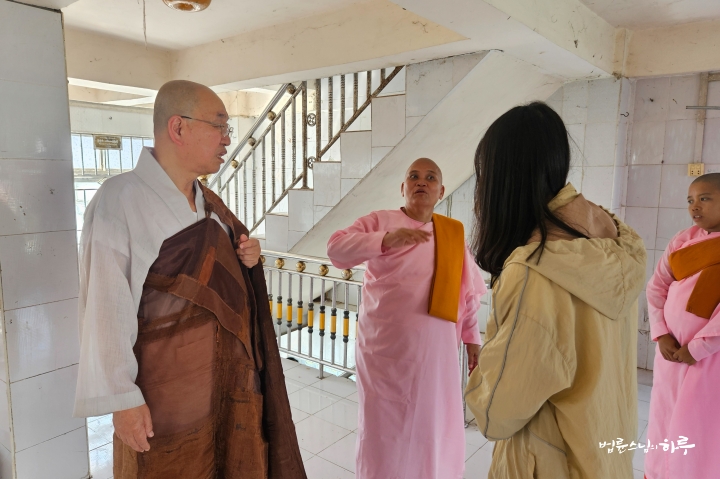
The abbess said that if JTS could provide just the materials, the temple could secure labor through donations, and the lay practitioners would take responsibility for construction management. Sunim promised that JTS would review the matter if they sent detailed construction and renovation plans with cost estimates, and then left the nunnery.
The next place they visited was Dhamma Gun Yee Myint Myint Khin Nunnery. The school building here was severely damaged by the earthquake. The total number of students was about 600, with 80% being from refugee backgrounds. Among them, about a hundred were female monastics (nuns) living in dormitories, while the remaining 500 commuted from outside. The abbess here also managed a nearby novice school, which had 140 male novice students. Currently, they were barely continuing classes in the old building, but safety issues and lack of space were serious problems.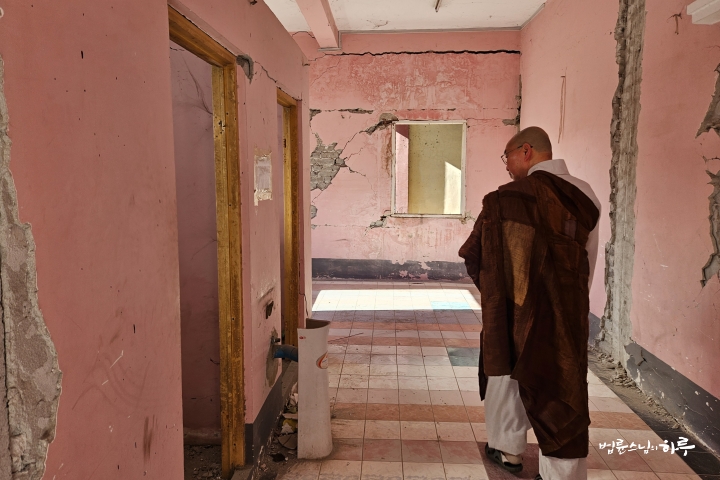
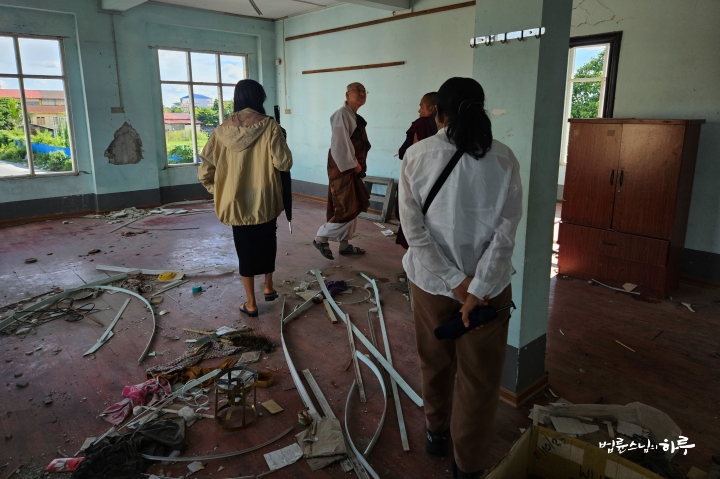
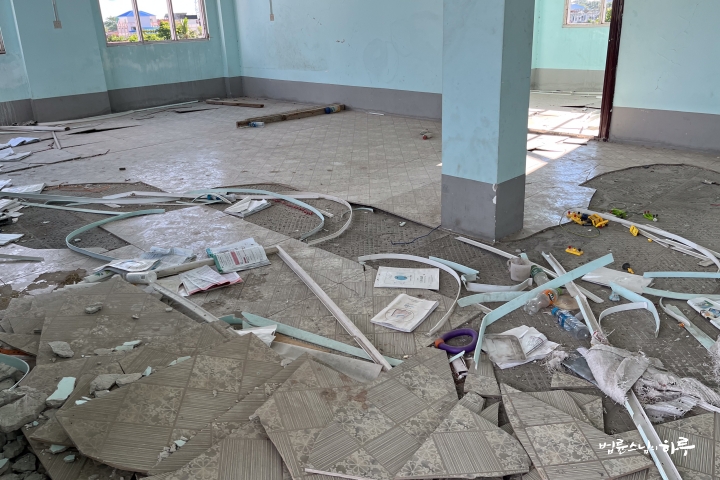
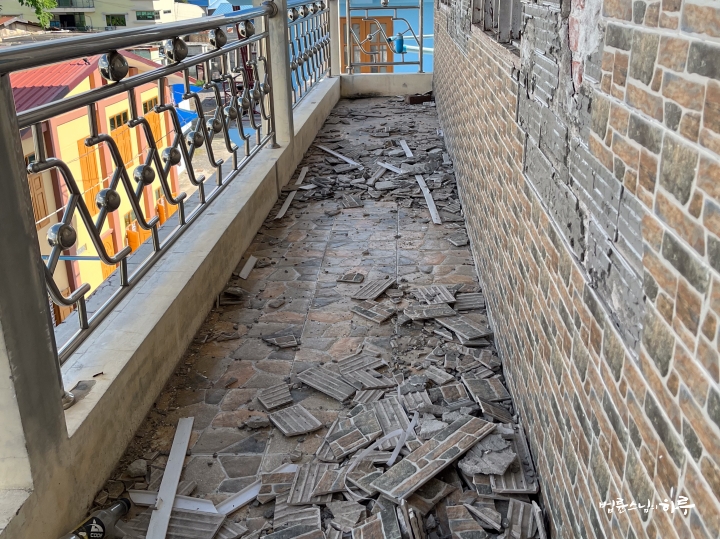
After touring the school, they had a conversation with the abbess and the principal. The 80-year-old abbess was caring for both the young novices and nuns.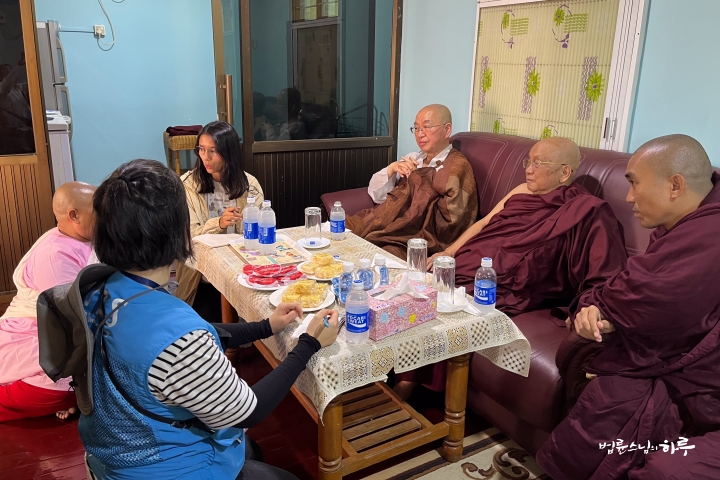
The abbess said that there was currently insufficient space for students to study and that a three-story building was needed. She explained that six classrooms were needed on each of the first and second floors, with an auditorium on the third floor, and that teacher meeting rooms and restrooms were essential on every floor. She explained that these were government-mandated standards, requiring a certain number of classrooms based on student enrollment.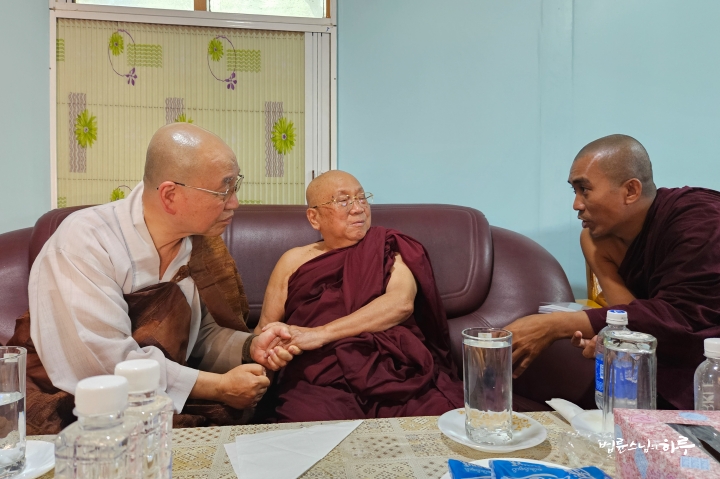
Sunim said he would actively review the matter if they sent a plan with detailed blueprints and budget, and then left the nunnery.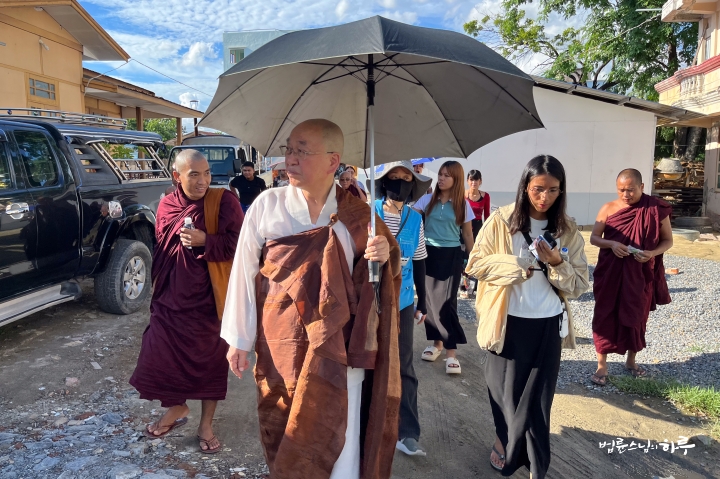
After completing the nunnery visits, they arrived at their accommodation at 5 PM. After unpacking and washing up briefly, at 7:30 PM they went to Khin Ma Gan Temple to meet San San Maw, president of the refugee recovery support group, and Venerable Kovida.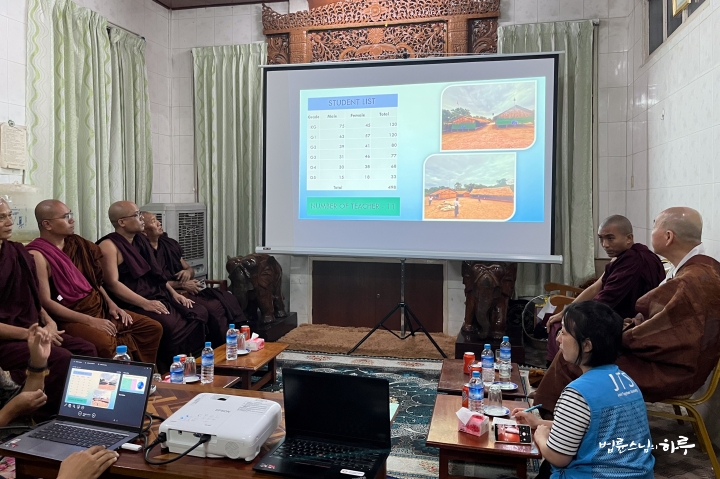
San San Maw explained in detail the operational achievements and difficulties of the Sagaing refugee camp. The Sagaing refugee camp consisted of people from eight villages who had left their homes due to earthquakes and conflicts, mostly women and children.
The camp had provided food and hygiene supplies to a total of 1,695 households, 4,471 people. Operations were led by senior monks and the recovery support group, who conducted preliminary surveys to understand each family’s needs and provided tailored support accordingly. Beyond simple distribution of goods, they were installing latrines and conducting hand-washing and hygiene education.
Meanwhile, this area was on the border between government and rebel forces, posing a high risk of landmine accidents. The camp was conducting landmine safety education in preparation for this, and some residents had actually experienced landmine accidents.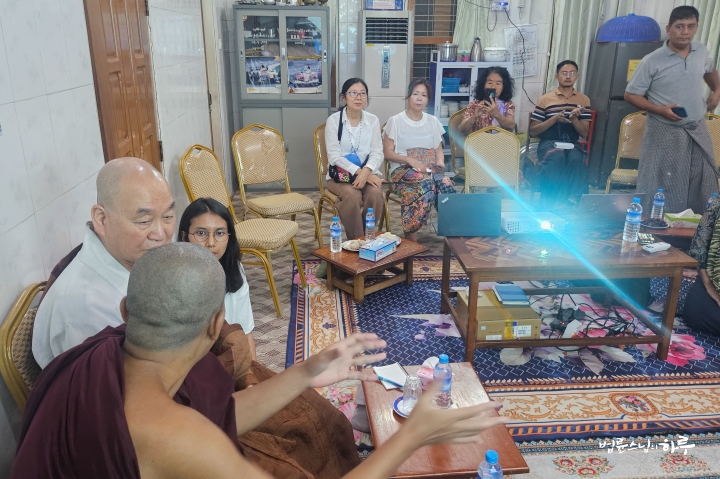
However, many difficulties still existed. Government regulations sometimes delayed delivery of supplies, and poor road conditions meant repeatedly turning back while trying to enter the camp. Poor communication infrastructure meant contact was often impossible, frequently delaying administrative work and donor reports. Local supply of goods was insufficient, requiring materials to be brought from distant areas, and rising rice prices were making life increasingly difficult. Most heartbreaking was that due to delayed arrival of sanitary pads, some women were taking medication to stop their periods. Though unhealthy, they had no other choice.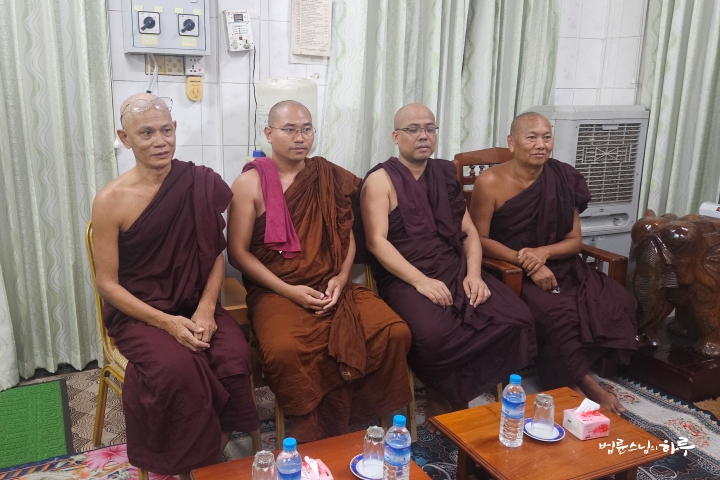
Finally, Venerable Kovida explained what else the camp would need going forward. Due to still inadequate basic sanitation, more hand-washing facilities needed to be installed, and the currently provided food, hygiene supplies, and cash support needed to continue monthly. Additionally, income-generating tools like sewing machines for self-sufficiency, medicines for basic medical care, and professional volunteers for health education and mental counseling were desperately needed. Beyond mere survival, a foundation for self-reliance was urgently required.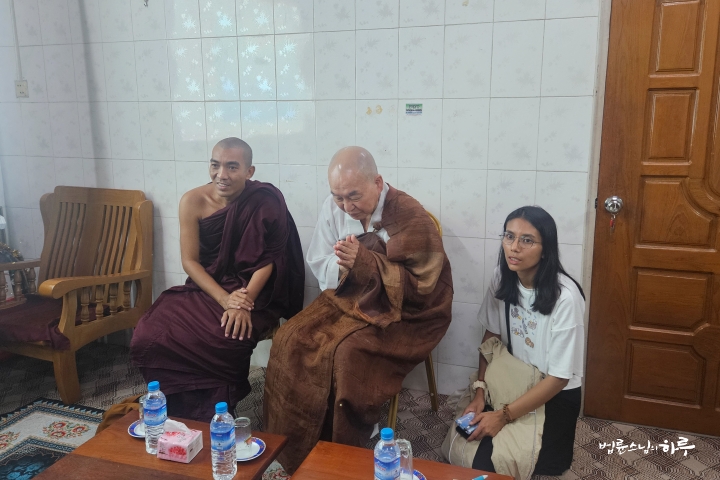
By the time they finished listening to the explanations, it was nearly 9 PM. After expressing gratitude to the monks for their detailed explanations, they returned to their accommodation and concluded the day.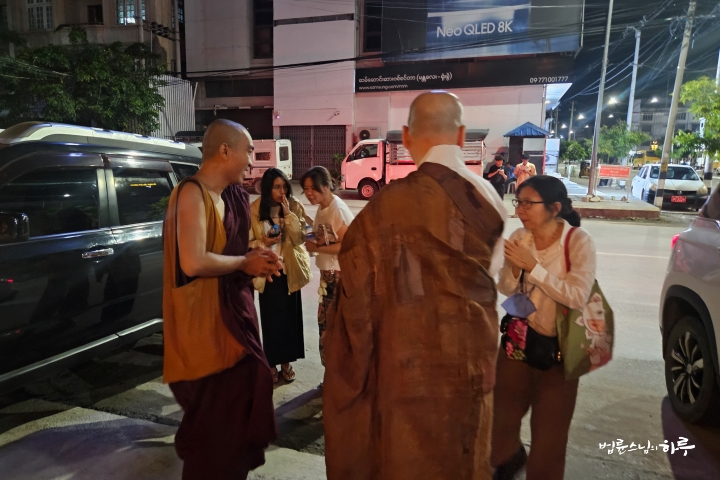
Tomorrow, after the live broadcast of the Weekly Dharma Assembly in the morning, they will tour the Sagaing refugee camp. In the afternoon, they will visit Shwe Yan Lin Min Kyaung Temple and deliver relief supplies to 130 refugee households, then in the evening visit Paung Daw Oo Temple and the temple operated by Venerable Kittisara.
Since there was no Dharma talk today, I’ll conclude by sharing a dialogue between Sunim and a questioner from the Dharma Q&A held in Berlin, Germany on the 12th.
I’m Living Well, but I Feel Anxious About Whether I Deserve to Be Happy
“Right now, you are clinging to your current happiness. You’re afraid of breaking up with your boyfriend and anxious about possibly losing your current job. The reason you keep wondering if you deserve to be happy is because you want to maintain what you currently have.
According to Buddha’s teachings, everything in this world is impermanent. Nothing lasts forever. Your parents could suddenly pass away, your boyfriend could say he wants to break up, or your workplace could let you go. This doesn’t mean these things will definitely happen, but rather that life has various possibilities. Our life is like a thrown ball. We don’t know which direction it will bounce. However, while we don’t know if the ball will bounce right or left, we at least know that it will bounce. Thus, there is certainty within uncertainty. There is also uncertainty within certainty. From the outside, most things seem inevitable, but when examined closely, everything is uncertain. When you understand this principle, you can be satisfied with the present while also being prepared for the future.
You’re unable to fully enjoy even your current happiness because you worry about whether your good situation will continue into the future. I’m not saying to just enjoy the present without caring about tomorrow, but rather to live with the awareness that everything can change at any time. If your boyfriend strays, it would be disappointing but unavoidable. In such a case, thinking ‘How could you betray me?’ would negate even the past happiness, ultimately wasting your life. On the other hand, if you conclude with ‘I was happy during the time we spent together,’ then the past becomes completely yours. Even if you suddenly have to quit your job, if you think that you had a good time at the company, it becomes a complete part of your life.
Just as you came from Korea to Germany and adapted, whether you meet this person or that person, work at this job or move to another, in the big picture, it’s all the same. Sometimes things might get worse than before, sometimes better. You only know by living through it. Currently, you like this person so much that you’d be discouraged if he turned away, but you might meet someone else and be even happier. There are cases where people lived in Syria, became refugees and went through really hard times, but after coming to Germany and adapting, found it much better. What you thought went well can turn out badly, and what you thought went wrong can turn out well. That’s why we have sayings like ‘misfortune can be a blessing in disguise’ and ‘a silver lining.’
I originally wanted to be a scientist, but became a monk after my teacher’s persuasion. So when I was young, it was very difficult to give up my dream of being a scientist. But after living as a monk for 55 years, this is also fine. I’m satisfied even though I took a path I didn’t want, while you suffer despite doing what you wanted. So whether you want something or not seems important at the moment, but in the long run, it’s not that important. These days, many people love each other so much they get married, only to eventually separate, but in the Joseon Dynasty, many people lived well together despite marrying without even seeing each other’s faces. In Mongolia, men go to other tribes to kidnap women for marriage. If caught by the woman’s tribe on the way back, they die, but if they safely reach their own tribe, they marry. The woman also resists to the end during the kidnapping, but if she ends up at the man’s tribe, she accepts the marriage.
So instead of thinking only about what’s good right now, you need an attitude that keeps various possibilities open. You prefer working as a regular employee at one company for a long time, but why should a person be born only to work at one company? There’s no need to insist on just one workplace. If you have the vain thought of wanting to maintain happiness forever, you won’t be able to properly enjoy even your current happiness. If you live with the future possibilities slightly open, you’ll be satisfied with the present too.”
“Thank you. I understand.”





